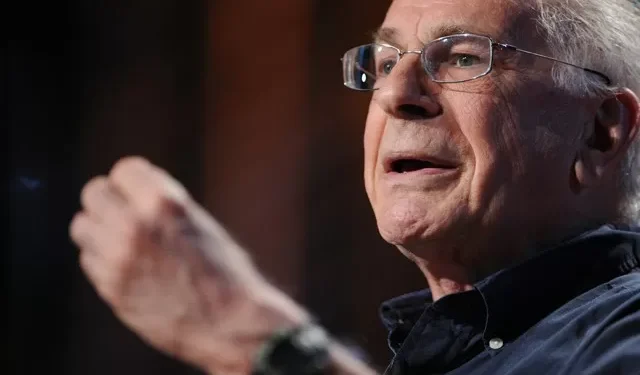The world of economics has lost one of its greatest minds with the passing of Nobel laureate Daniel Kahneman. The renowned psychologist, who passed away at the age of 90, was a pioneer in the field of behavioral economics and his contributions have revolutionized the way we understand and approach economic decision-making.
Born in Tel Aviv, Israel in 1934, Kahneman’s early life was marked by the turmoil of World War II. Despite the challenges, he excelled academically and went on to study psychology at the Hebrew University of Jerusalem. After completing his undergraduate studies, he moved to the United States to pursue a PhD at the University of California, Berkeley.
Kahneman’s groundbreaking work began in the 1970s when he collaborated with his colleague Amos Tversky to develop the prospect theory. This theory challenged the traditional economic assumption that individuals always make rational decisions based on self-interest. Instead, Kahneman and Tversky proposed that human decision-making is influenced by cognitive biases and heuristics, leading to irrational and often suboptimal choices.
Their research had a profound impact on the field of economics, which had long been dominated by the rational choice theory. Kahneman and Tversky’s work opened up a whole new area of study known as behavioral economics, which combines insights from psychology and economics to better understand human behavior in economic decision-making.
In 2002, Kahneman was awarded the Nobel Prize in Economics for his contributions to behavioral economics. He was the first non-economist to receive this prestigious honor, solidifying his position as a pioneer in the field. His work has had a lasting impact on the way economists and policymakers approach issues such as consumer behavior, financial markets, and public policy.
But Kahneman’s influence extended far beyond the academic world. He was a prolific writer and his book “Thinking, Fast and Slow” became a bestseller, introducing his ideas to a wider audience. In this book, he explains the two systems of thinking that govern our decision-making – the fast, intuitive system and the slow, deliberate system. He also delves into the various cognitive biases and heuristics that can lead us astray in our decision-making.
Kahneman’s work has also had a significant impact on public policy. His research on the role of emotions in decision-making has been used to inform policies related to healthcare, education, and environmental protection. His insights have also been applied in the business world, with companies using behavioral economics to better understand consumer behavior and improve their marketing strategies.
Despite his groundbreaking achievements, Kahneman remained humble and down-to-earth. He was known for his kindness, generosity, and willingness to mentor young researchers. He was also a strong advocate for interdisciplinary collaboration, recognizing the importance of bringing together different fields to solve complex problems.
As news of Kahneman’s passing spread, tributes poured in from all over the world. His colleagues and students remembered him as a brilliant thinker, a mentor, and a friend. His contributions to the field of economics have been described as “monumental” and his legacy will continue to inspire future generations of researchers.
In his own words, Kahneman once said, “I am a psychologist, not an economist. I am not a theorist, I am an observer.” And it is this keen observation of human behavior that has made him the grandfather of behavioral economics. His work has not only challenged traditional economic theories but has also provided a deeper understanding of human decision-making, paving the way for more effective and impactful policies.
In conclusion, the world has lost a true visionary with the passing of Daniel Kahneman. His groundbreaking work has left an indelible mark on the field of economics and his insights will continue to shape our understanding of human behavior for years to come. He will be remembered as a pioneer, a Nobel laureate, and above all, a kind and generous human being. Rest in peace, Daniel Kahneman.



